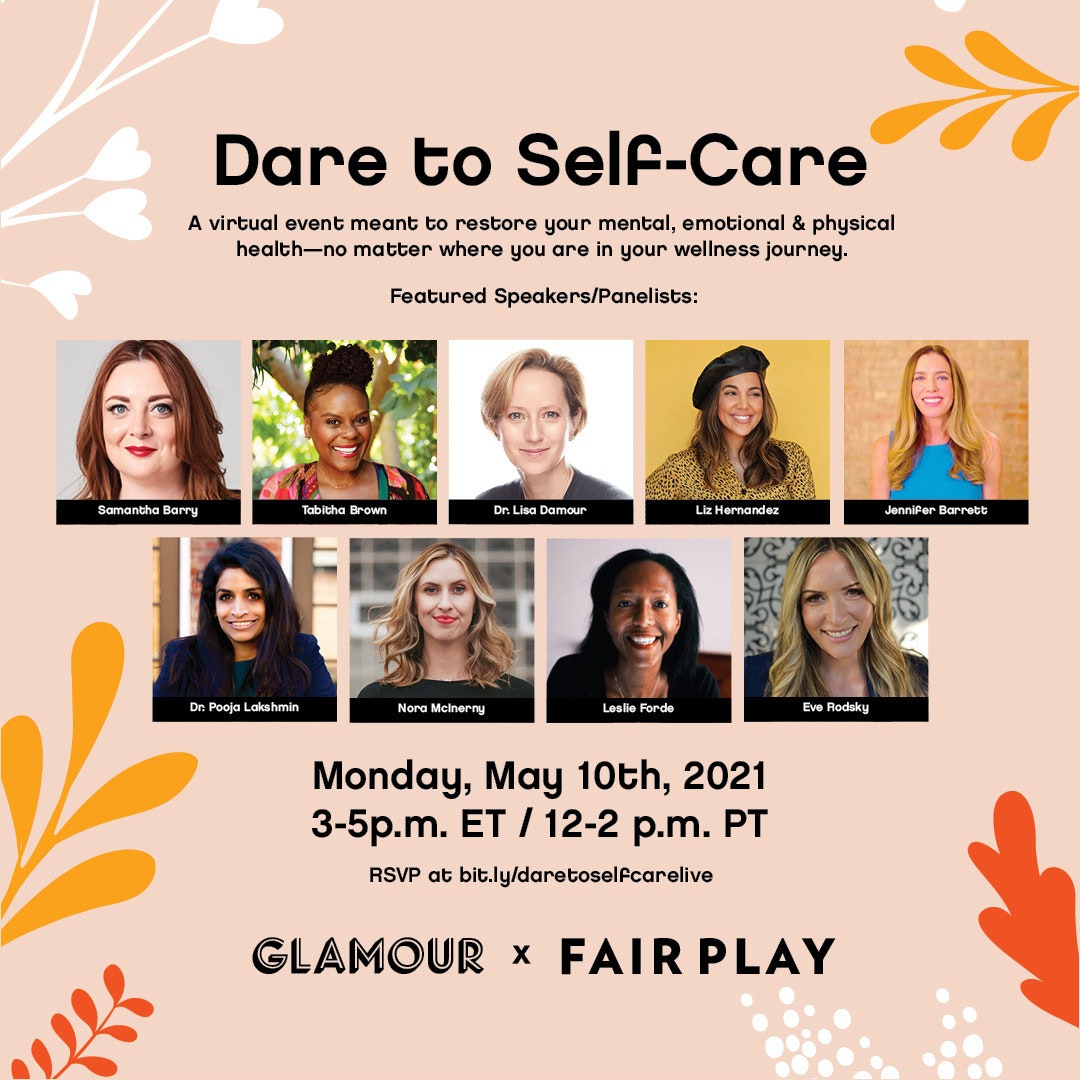Dare to Self-Care keynote speaker and best-selling author Eve Rodsky promises meaningful self-care tips—beyond the standard “Try a bubble bath!” advice.

The Pandemic’s Done a Number On Our Mental Health. This Free Event Wants to Help Women Recover
This article is part of a series showcasing the thought-leaders who will take the (virtual) stage for Dare to Self-Care, a free event meant to help women everywhere restore their mental, emotional, and physical health—no matter where they are in their wellness journeys. Click here to join the party at 3 p.m. ET/12 p.m. PT on Monday, May 10.
Even as more and more women join the workforce, we’re still often doing most of the work at home, too. Not just the cooking and the cleaning, but the invisible minutiae that allow a household to get—and keep—its shit together. It’s what sociologist Arlene Kaplan Daniels once described as “the work involved in the social construction of daily life.” It’s not the “real work” or the literal heavy lifting; it’s, “When is the dog’s check-up?” and “What kind of cardboard does the second-grader need for his school project?” These are the questions women find themselves simultaneously asking and answering—over and over again, every waking hour of every day.
The pandemic-induced deterioration of work-life boundaries has exacerbated this gender imbalance, forcing women to ask (and answer) one more question: What is our time really worth? For author Eve Rodsky, who drew from Kaplan Daniels for her book Fair Play, the answer lay somewhere in her car, between a breast pump, client contracts, and some blueberries.
“‘Become a gendered-division-of-labor expert’ was not in my diary in third grade,” says Rodsky, while on deadline for her second book. Instead, she would find her eventual career path during “a breakdown on the side of the road over off-season blueberries.” In the middle of a chaotic day of work and domestic errands, she got a text from her husband: “I’m surprised you didn’t get blueberries.” The six-word message felt like a receipt for her time, and it wasn’t worth as much as his. It confirmed what Rodsky had long suspected: that every household and child-care duty had become, by default—or as she puts it, a “she-fault”—hers.
“I had a pen between my legs to mark up the contracts. I was driving to pick up my older son from his toddler transitional program, and the pen was stabbing me in the vagina every time I hit the brakes. This pen was the metaphor for the day: being stabbed in the vagina. I felt I was failing my family and my husband for not being the fulfiller of his smoothie needs,” says Rodsky.
How did someone with such professional clout—a Harvard Law degree and a job in foundation management at J.P. Morgan—find herself in a marriage where she was also tasked with the bulk of her family’s housework, too?
In that side-of-the-road breakdown moment, she was far from alone. Even in many households where the man in the heterosexual couple believes men and women are equal, it’s still assumed that most domestic tasks fall on the woman. According to the United Nations, women carry out at least two and a half times more unpaid household work than men. In a practical sense, this limits our professional prospects—less time for paid labor or for pursuing qualifications—and in a personal sense, it devours time that could be spent on hobbies, friendships, or self-exploration. So an unequal division of household labor can chip away at a woman’s identity.
During next week’s Dare to Self-Care virtual event, Rodsky will explore the concept of “unicorn time”—a space where women can explore the skills, interests, and passions that keep them “vibrant.”
RSVP here.
She’ll also discuss her Fair Play system: After the blueberry incident, Rodsky drew up a spreadsheet. Titled “Shit I Do,” the document was a scrupulous inventory of each task she completed for her family. While Rodsky calls her early research “me-search,” she went on to interview 500 men and women about invisible labor. The combination of her work as a mediator, as an organizational management professional, and as a wife and mother snowed under by a disproportionate number of domestic tasks proved to be a thing of beauty. Fair Play became a New York Times bestseller and cemented Rodsky’s status as a feminist organizational hero. Both a card game and a book, the Fair Play system identifies 100 tasks a couple can divide based on the unique needs of each household.
And she’ll speak to what she believes to be the final frontier for women: “Private lives are public issues,” Rodsky says. “The home is dangerous, it’s the last frontier of feminism because it’s the place closest to us. It manifests as fights over off-season blueberries, but really what we’re fighting over is a society which has been designed off the backs of the unpaid labor of women.”
She also plans to share practical strategies to restore mental and physical health, establish boundaries, and advocate for time for self-care—beyond the standard tropes. “Mental wellness is no bubble bath,” Rodsky says. “Looking at time as a true boundary for women is the definition of mental health, for me. It’s the idea that we deserve time to be unavailable. That we deserve to assert boundaries over our time. That we value our time as diamonds, not sand.”
Dare to Self-Care is a free virtual event brought to you by Glamour, Fair Play, and CVS. Click here to RSVP.
This story originally appeared on: Glamour - Author:Serena Coady





























